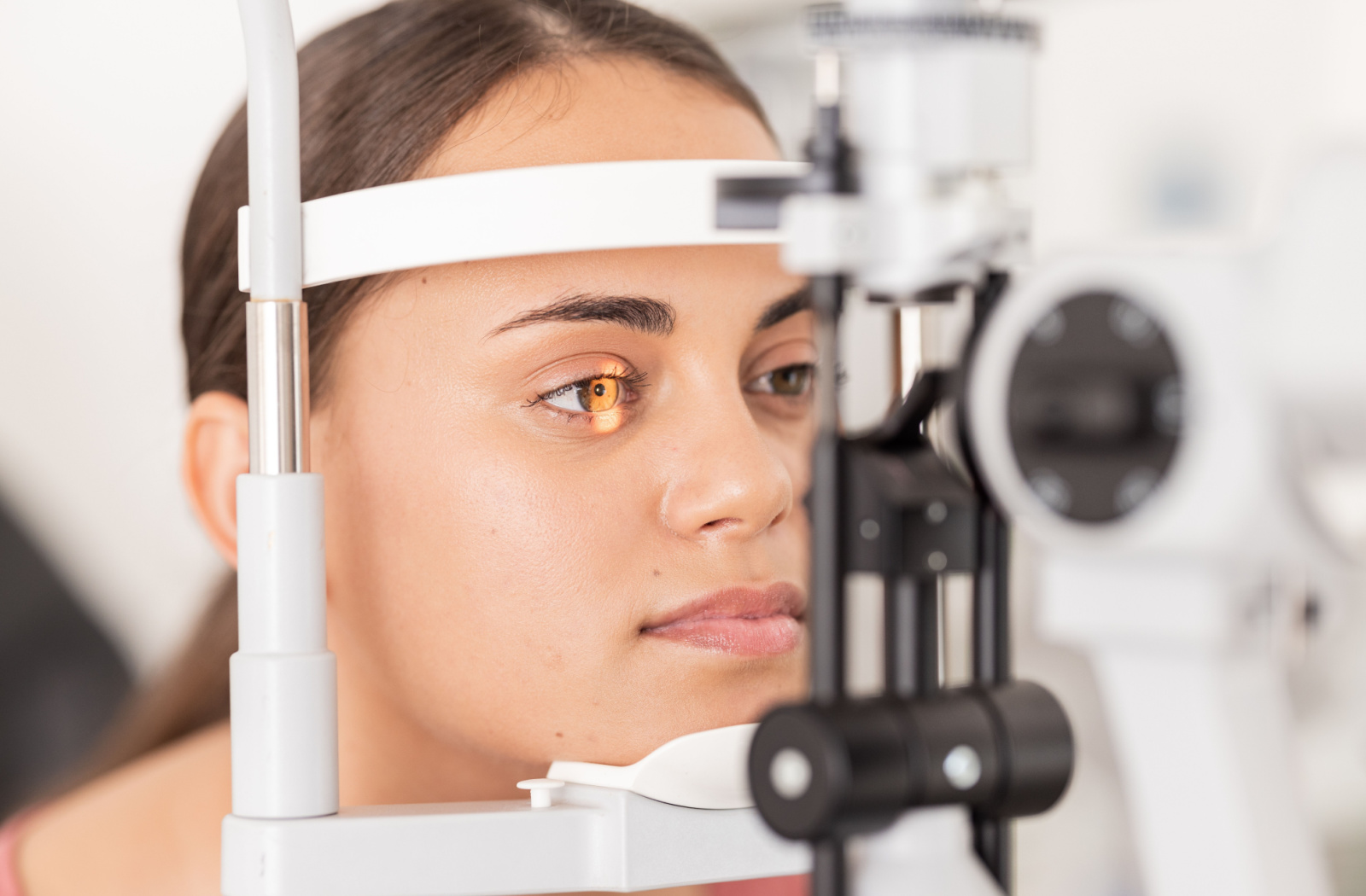There isn’t a single answer to how long vision problems last after a concussion because it’s determined by several varying factors like the severity of the concussion, part of the brain affected, or an individual’s vision before the concussion. You may have vision problems for as little as a few weeks, but they could last for several years, too.
It’s important to seek medical help from your eye doctor if you develop vision problems after a traumatic head injury or concussion, especially if the symptoms are persistent for several months or more. An eye doctor can examine your eyes to determine their health and your vision needs. Then, they may recommend something like vision therapy to treat your visual symptoms.
Concussion-Related Vision Problems
Concussion-related vision problems typically fall into two categories: problems with visual acuity—how clear the vision is—and problems with visual processing. Problems with visual acuity can include blurry vision, double vision, or difficulty focusing on objects at varying distances.
On the other hand, visual processing issues can include increased sensitivity to light, visual disturbances such as flashing lights or floaters, or difficulty tracking moving objects.
How Long Do Vision Problems Last After a Concussion?
Vision problems related to a concussion will often improve within 1 or 2 weeks on their own with intervention following the injury for many individuals. Some individuals could experience persistent vision issues that last longer—sometimes unresolved for years. It’s crucial to contact your eye doctor as soon as possible if you experience vision problems following a concussion that worsen over time.
Symptoms of Post-Concussion Vision Problems
Vision problems following a concussion aren’t necessarily unique. For example, blurry vision could be a sign of a refractive error like near or farsightedness. But it’s important to have your doctor rule out other possibilities, especially if your vision is suddenly blurry following a head injury.
Some of the following symptoms or problems could be concussion-related and should be diagnosed by an eye doctor.
Blurry Vision
While many people associate blurry vision with nearsightedness, farsightedness, or astigmatism, it can also be a symptom of post-concussion vision problems. Contact your eye doctor for an evaluation if your eyes struggle to focus, you’re seeing double, or the world around you looks hazy or unclear. They may recommend prescription glasses, vision therapy, or other treatment options.
Sensitivity to Light
Light sensitivity, also known as photophobia, could be another symptom of post-concussion vision problems. Those who have experienced light sensitivity may find that bright or even normal light sources can feel overwhelming or painful.
Floaters
It’s possible to develop floaters after a concussion or other head injury, especially if the impact causes changes in the eye, like a vitreous detachment. Floaters appear as small specks or squiggles in your vision and are usually harmless, but a sudden increase—especially with flashes of light or a dark shadow—could signal a retinal issue. While not a common concussion symptom, any new or worsening visual changes after head trauma should be checked by an eye care professional right away.
Eye Tracking Difficulty
Following an object as it moves through your field of vision can become challenging after a concussion. People who experience a concussion may struggle to focus on reading, watching TV, or other activities that require focus. Physical therapy, such as balance and coordination exercises, can alleviate this symptom. Vision therapy may also be beneficial in some cases.
Dizziness & Vertigo
Both dizziness and vertigo can be symptoms of a post-concussion vision problem. If you continually feel off balance, unsteady, or dizzy, an evaluation may be needed to determine the cause. Using prescription lenses or a referral to a physical therapist may help alleviate these symptoms. Your eye doctor can help you determine which medical professional you need to see.
Headaches or Migraines
Headaches or migraines that occur after a concussion can be a symptom of post-concussion vision problems. It’s essential to seek medical care if you experience a headache accompanied by uncomfortable visual disturbances or migraines that occur more frequently or are more severe. Treatment may include specific visual aids, prevention strategies, pharmaceuticals, or vision therapy.
Post-Concussion Vision Therapy
An eye doctor may recommend vision therapy when vision problems persist beyond a few months.
What Is Vision Therapy?
Vision therapy, also known as visual training or orthoptics, is designed to improve the vision of individuals who have difficulty focusing or coordinating their eyes. This therapy involves using specialized techniques and exercises that help strengthen the eyes and improve their coordination with the brain. Vision therapy is designed to treat a range of visual disorders, from problems in eye movements and eye focusing to visual perceptual problems.
Benefits of Vision Therapy
Vision therapy can benefit individuals with a range of disorders, as well as those who have suffered a traumatic brain injury or stroke. The treatment can help improve visual processing skills, including visual memory and visual-motor integration. It can also help improve attention, reading skills, and sports performance.
Vision therapy can also benefit those experiencing digital eye strain, a condition caused by prolonged use of digital devices. Vision therapy can help alleviate eye discomfort, headaches, and fatigue associated with this condition.

Discuss Your Vision Needs with an Eye Doctor
Concussions are common with traumatic head injuries. Fortunately, vision problems often resolve themselves without problem after a few weeks. But there may be situations where the problem persists for months or even years.
Contact our team at The Eye Gallery today if you’re experiencing any visual issues following a concussion. We’re happy to get you in so that one of our experienced eye doctors can examine your eyes and determine whether something like vision therapy could be beneficial for your recovery.




